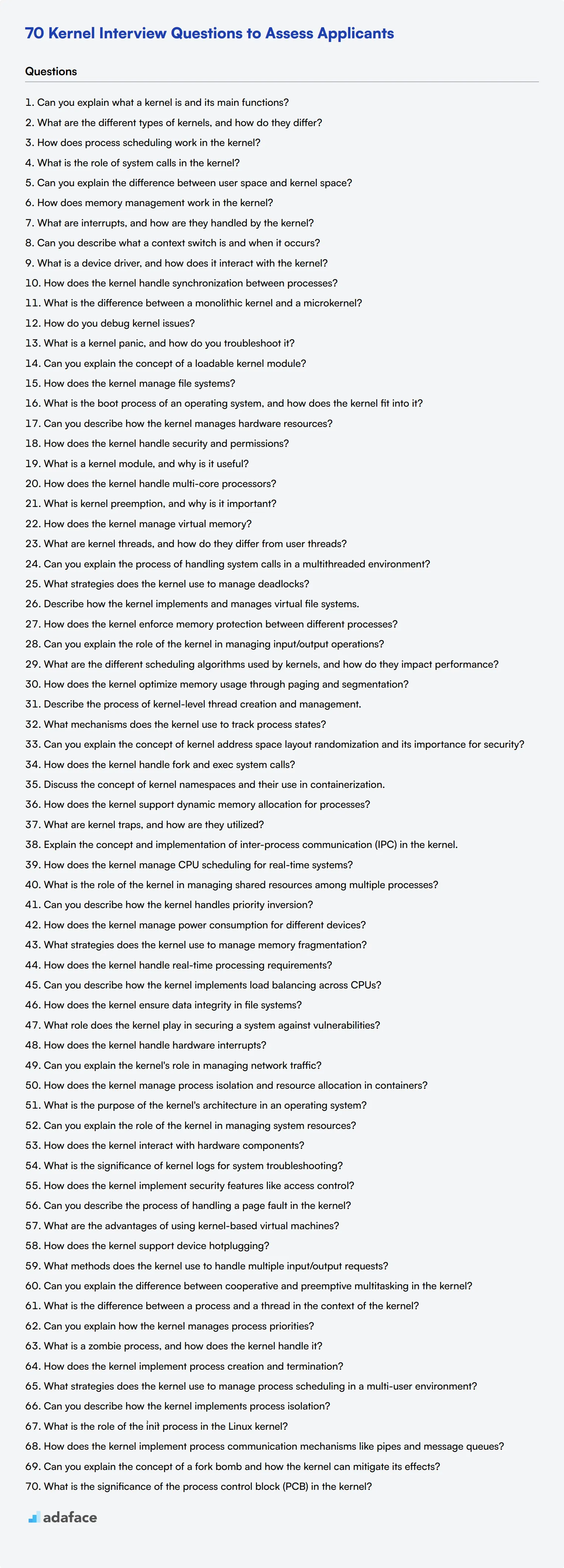Kernel interview questions are a powerful tool for assessing candidates' understanding of operating system internals and low-level programming. By asking the right questions, interviewers can gauge an applicant's depth of knowledge in system architecture and their ability to work with core OS components.
This blog post provides a comprehensive list of Kernel interview questions, categorized by difficulty level and topic. From basic concepts to advanced topics, we cover a wide range of questions suitable for evaluating junior, mid-tier, and senior engineers.
Using these questions, you can effectively assess candidates' Kernel expertise and make informed hiring decisions. Consider complementing your interviews with a Linux skills assessment to get a more complete picture of a candidate's abilities.
Table of contents
15 basic Kernel interview questions and answers to assess applicants
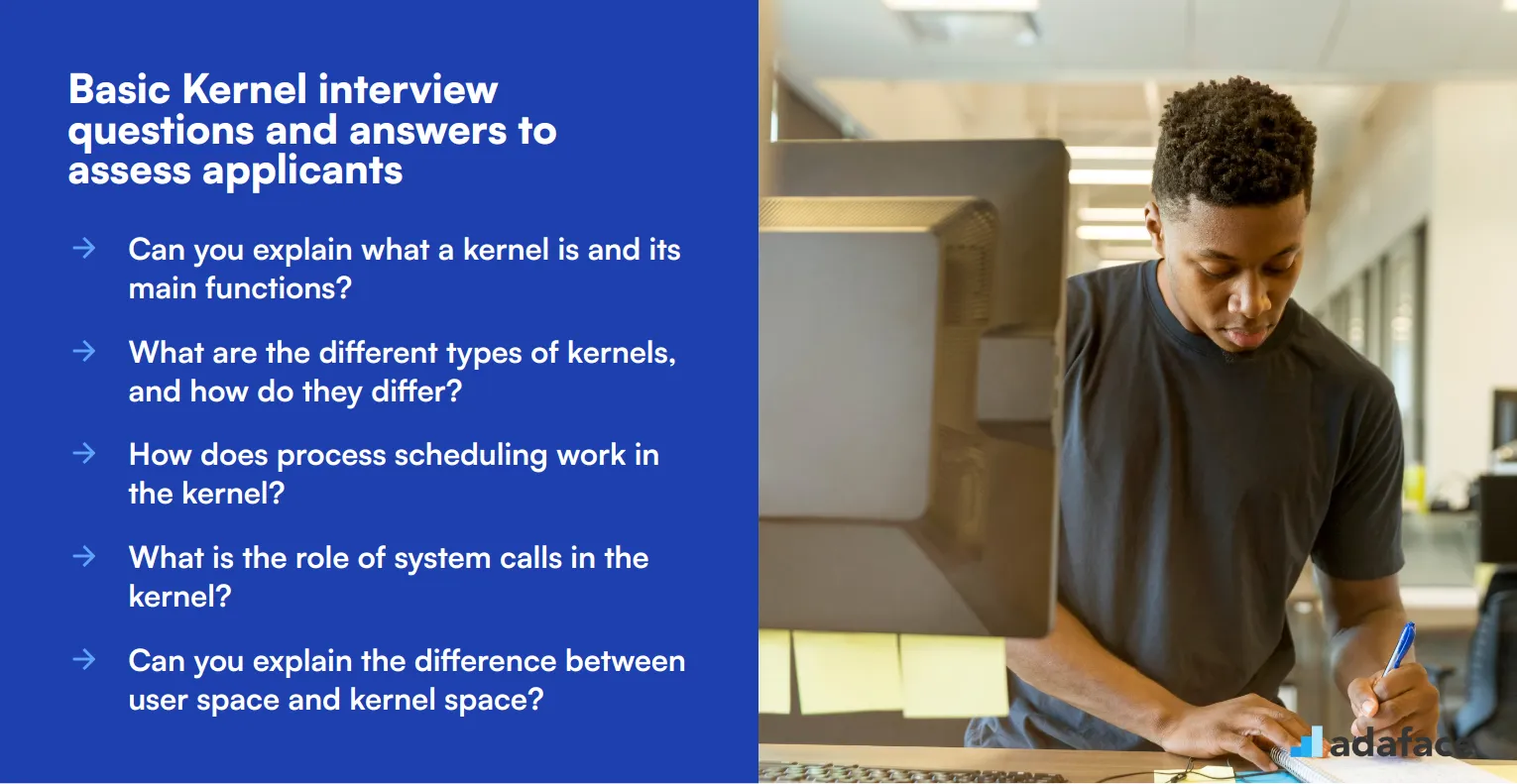
To determine whether your applicants have a solid understanding of kernel development and functionality, use these 15 basic kernel interview questions. These questions will help you gauge a candidate's proficiency and suitability for roles like software engineer.
- Can you explain what a kernel is and its main functions?
- What are the different types of kernels, and how do they differ?
- How does process scheduling work in the kernel?
- What is the role of system calls in the kernel?
- Can you explain the difference between user space and kernel space?
- How does memory management work in the kernel?
- What are interrupts, and how are they handled by the kernel?
- Can you describe what a context switch is and when it occurs?
- What is a device driver, and how does it interact with the kernel?
- How does the kernel handle synchronization between processes?
- What is the difference between a monolithic kernel and a microkernel?
- How do you debug kernel issues?
- What is a kernel panic, and how do you troubleshoot it?
- Can you explain the concept of a loadable kernel module?
- How does the kernel manage file systems?
8 Kernel interview questions and answers to evaluate junior engineers
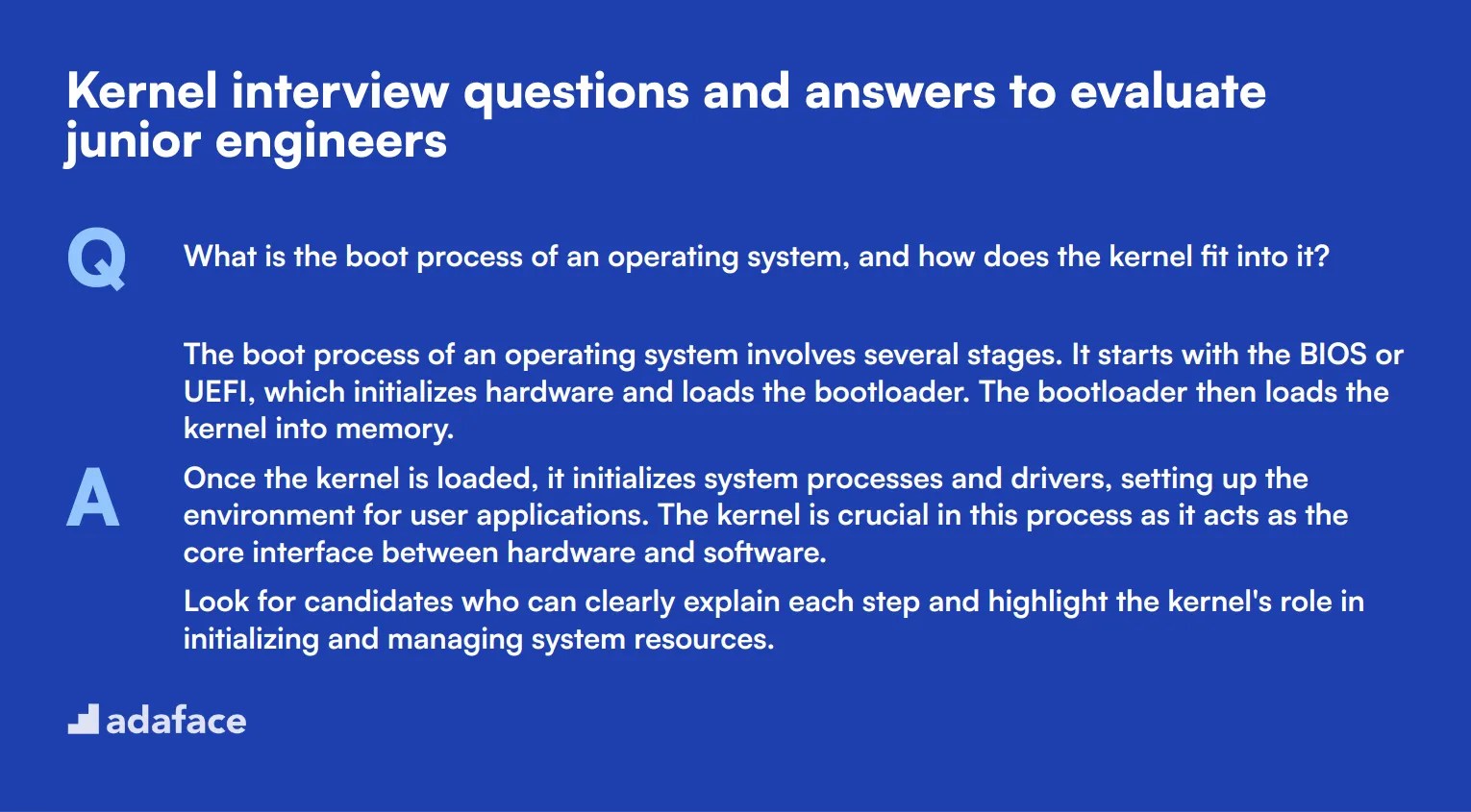
If you're looking to evaluate the technical knowledge of junior engineers in kernel-related topics, this list of questions is your go-to resource. These questions are designed to tap into their understanding without being overly technical, making them perfect for face-to-face interviews.
1. What is the boot process of an operating system, and how does the kernel fit into it?
The boot process of an operating system involves several stages. It starts with the BIOS or UEFI, which initializes hardware and loads the bootloader. The bootloader then loads the kernel into memory.
Once the kernel is loaded, it initializes system processes and drivers, setting up the environment for user applications. The kernel is crucial in this process as it acts as the core interface between hardware and software.
Look for candidates who can clearly explain each step and highlight the kernel's role in initializing and managing system resources.
2. Can you describe how the kernel manages hardware resources?
The kernel manages hardware resources through device drivers and system calls. Device drivers are specialized programs that allow the kernel to communicate with hardware devices.
System calls are used by applications to request services from the operating system. The kernel handles these requests, ensuring efficient and secure access to hardware resources.
An ideal candidate should demonstrate an understanding of both device drivers and system calls, and how these components work together to manage hardware.
3. How does the kernel handle security and permissions?
The kernel handles security and permissions through mechanisms like user accounts, access control lists, and security modules. It enforces permissions to ensure that users and processes only access resources they are authorized to use.
Security modules, such as SELinux, provide additional layers of security by enforcing stricter access controls and policies.
Candidates should be able to explain these mechanisms and provide examples of how they enhance system security. Look for an understanding of both basic and advanced security features.
4. What is a kernel module, and why is it useful?
A kernel module is a piece of code that can be loaded and unloaded into the kernel at runtime, without requiring a reboot. This allows for extending kernel functionality dynamically.
Kernel modules are useful for adding new features or drivers to the system without disrupting its operation. They provide flexibility and modularity in system design.
Strong candidates should highlight the benefits of modularity and flexibility, and possibly give examples of when they might use or have used kernel modules.
5. How does the kernel handle multi-core processors?
The kernel handles multi-core processors through process and thread scheduling. It distributes tasks across multiple cores to optimize performance and resource utilization.
Load balancing techniques are used to ensure that no single core is overwhelmed while others are idle. This improves overall system efficiency.
Look for responses that demonstrate an understanding of scheduling and load balancing. Candidates should be able to explain how these concepts contribute to efficient multi-core processing.
6. What is kernel preemption, and why is it important?
Kernel preemption refers to the ability of the kernel to interrupt a running process to switch to a higher-priority task. This ensures that critical tasks are handled promptly, improving system responsiveness.
Preemption is important for real-time systems where timely task execution is crucial. It also helps in maintaining system stability and performance.
Candidates should explain the concept clearly and provide examples of scenarios where preemption is beneficial. Understanding its importance in real-time and general-purpose systems is a good indicator of their knowledge.
7. How does the kernel manage virtual memory?
The kernel manages virtual memory using techniques like paging and segmentation. Virtual memory allows the system to use disk space as an extension of RAM, enabling efficient memory management.
Paging divides memory into fixed-size blocks, while segmentation divides it into variable-sized blocks, providing flexibility in memory allocation.
Look for candidates who can explain these concepts clearly and discuss their benefits. Understanding how virtual memory enhances system performance and memory management is key.
8. What are kernel threads, and how do they differ from user threads?
Kernel threads are managed by the operating system kernel and can perform low-level system tasks. They have higher privileges and direct access to system resources.
User threads are managed by user-level libraries and are scheduled by the application, not the kernel. They have limited access to system resources and rely on kernel threads for execution.
Candidates should demonstrate an understanding of both types of threads and their respective roles. They should also be able to explain scenarios where each type is used.
18 intermediate Kernel interview questions and answers to ask mid-tier developers
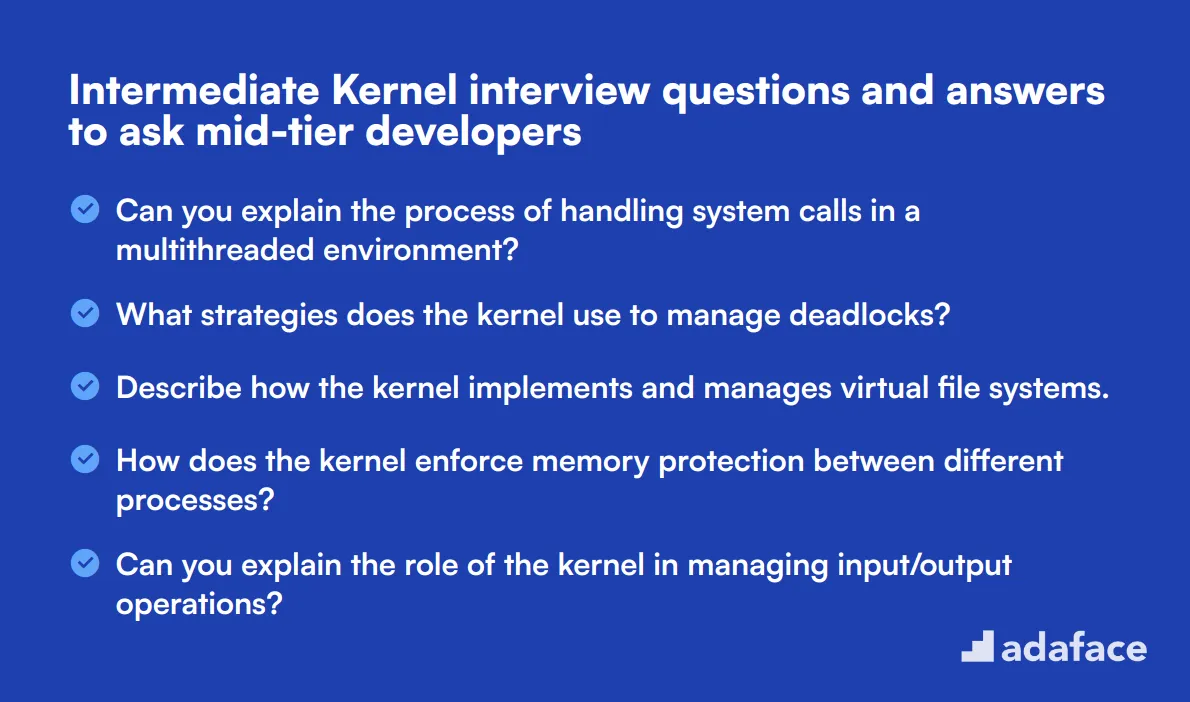
To evaluate whether your mid-tier developer candidates possess the essential knowledge needed for kernel-related tasks, consider using these 18 intermediate kernel interview questions. These questions are designed to gauge their technical depth and problem-solving abilities, ensuring they can handle more complex tasks effectively. For a comprehensive guide on what to look for in potential hires, you might also find this software developer job description helpful.
- Can you explain the process of handling system calls in a multithreaded environment?
- What strategies does the kernel use to manage deadlocks?
- Describe how the kernel implements and manages virtual file systems.
- How does the kernel enforce memory protection between different processes?
- Can you explain the role of the kernel in managing input/output operations?
- What are the different scheduling algorithms used by kernels, and how do they impact performance?
- How does the kernel optimize memory usage through paging and segmentation?
- Describe the process of kernel-level thread creation and management.
- What mechanisms does the kernel use to track process states?
- Can you explain the concept of kernel address space layout randomization and its importance for security?
- How does the kernel handle fork and exec system calls?
- Discuss the concept of kernel namespaces and their use in containerization.
- How does the kernel support dynamic memory allocation for processes?
- What are kernel traps, and how are they utilized?
- Explain the concept and implementation of inter-process communication (IPC) in the kernel.
- How does the kernel manage CPU scheduling for real-time systems?
- What is the role of the kernel in managing shared resources among multiple processes?
- Can you describe how the kernel handles priority inversion?
9 advanced Kernel interview questions and answers to evaluate senior engineers
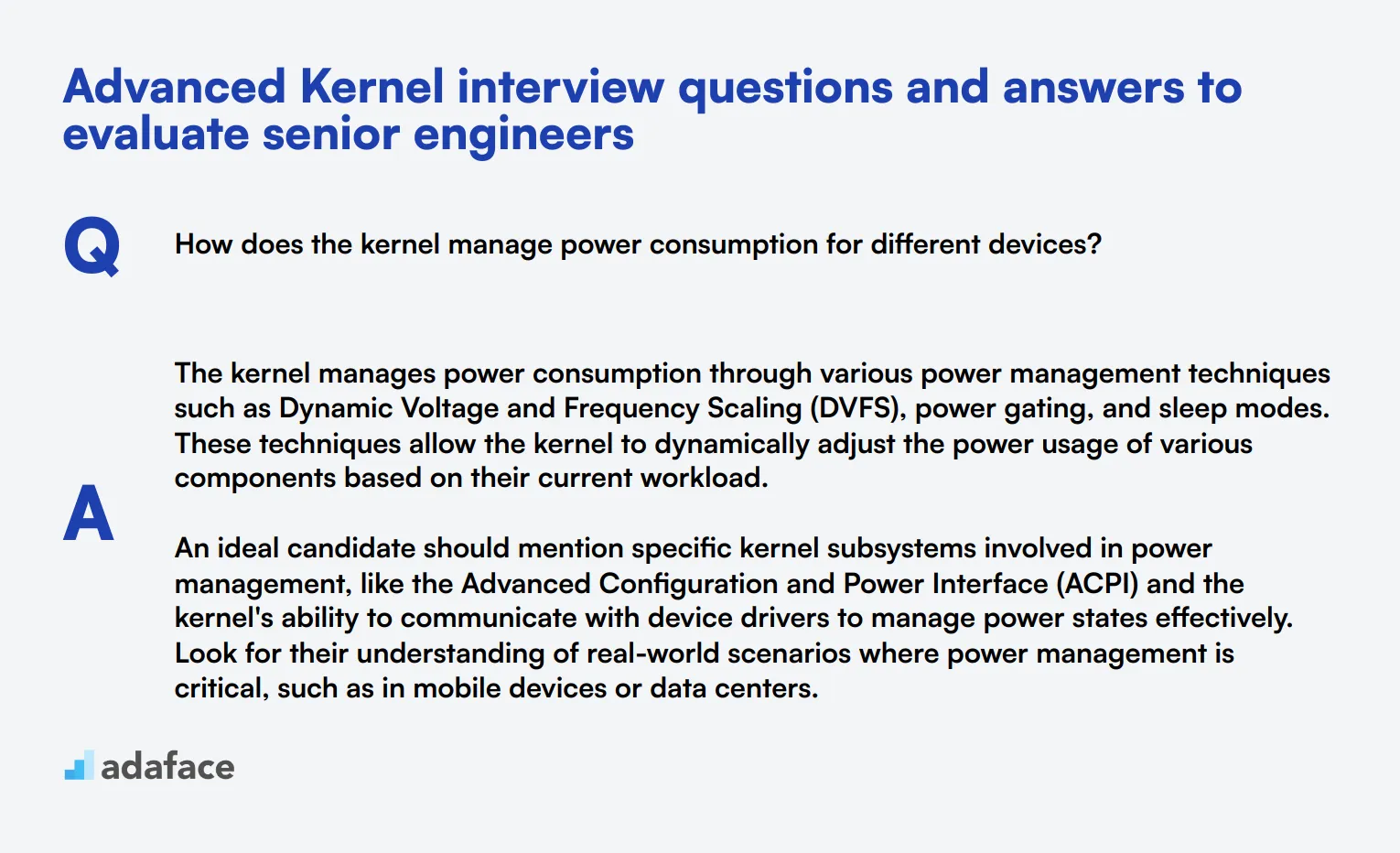
To evaluate whether senior engineers have the advanced knowledge necessary for kernel development, use these in-depth kernel interview questions. They’re designed to probe beyond the basics and assess a candidate's practical experience and problem-solving skills.
1. How does the kernel manage power consumption for different devices?
The kernel manages power consumption through various power management techniques such as Dynamic Voltage and Frequency Scaling (DVFS), power gating, and sleep modes. These techniques allow the kernel to dynamically adjust the power usage of various components based on their current workload.
An ideal candidate should mention specific kernel subsystems involved in power management, like the Advanced Configuration and Power Interface (ACPI) and the kernel's ability to communicate with device drivers to manage power states effectively. Look for their understanding of real-world scenarios where power management is critical, such as in mobile devices or data centers.
2. What strategies does the kernel use to manage memory fragmentation?
The kernel employs several strategies to manage memory fragmentation, such as buddy memory allocation, slab allocation, and compaction techniques. Buddy memory allocation divides memory into blocks to minimize fragmentation, while slab allocation manages memory for objects of the same size, reducing internal fragmentation.
Candidates should explain how the kernel's memory management unit works to allocate and free up memory efficiently. They should also discuss the trade-offs between these strategies and how they impact system performance. Strong answers will highlight real-world scenarios where memory fragmentation can affect system stability and performance.
3. How does the kernel handle real-time processing requirements?
The kernel handles real-time processing requirements by using real-time scheduling policies, such as Rate-Monotonic Scheduling (RMS) and Earliest Deadline First (EDF). These policies ensure that real-time tasks are prioritized over non-real-time tasks to meet their deadlines.
An ideal candidate should discuss kernel features like real-time patches or extensions (e.g., PREEMPT-RT) that enhance the kernel's capability to handle real-time workloads. They should also demonstrate an understanding of how to balance real-time and non-real-time processes to maintain overall system stability and performance.
4. Can you describe how the kernel implements load balancing across CPUs?
The kernel implements load balancing across CPUs using a load balancer that distributes tasks evenly across all available CPUs. It monitors the load on each CPU and moves tasks between them to ensure that no single CPU is overwhelmed while others are underutilized.
Candidates should mention kernel components like the Completely Fair Scheduler (CFS) and its role in load balancing. They should also discuss how the kernel handles asymmetric multiprocessing, where CPUs might have different performance characteristics. Look for their understanding of performance tuning and optimization in multi-core systems.
5. How does the kernel ensure data integrity in file systems?
The kernel ensures data integrity in file systems through mechanisms such as journaling, checksums, and redundancy. Journaling keeps a log of changes before they are committed to the file system, allowing recovery in case of failures. Checksums verify data integrity during read/write operations.
Strong candidates should highlight specific file systems like ext4, Btrfs, or ZFS that offer advanced data integrity features. They should explain how these mechanisms help prevent data corruption and support data recovery. Look for their ability to discuss trade-offs between performance and data integrity in different file systems.
6. What role does the kernel play in securing a system against vulnerabilities?
The kernel plays a crucial role in system security by implementing access controls, enforcing memory protection, and isolating resources. Features like SELinux, AppArmor, and seccomp provide fine-grained access control and sandboxing to limit the impact of vulnerabilities.
Candidates should discuss the importance of kernel updates and patches in mitigating security risks. They should also mention techniques like Kernel Address Space Layout Randomization (KASLR) that make it harder for attackers to exploit vulnerabilities. Look for their understanding of the balance between security and system performance.
7. How does the kernel handle hardware interrupts?
The kernel handles hardware interrupts by using interrupt handlers, which are special functions that execute in response to an interrupt signal from hardware devices. These handlers prioritize critical tasks and ensure timely processing of events.
Candidates should mention the role of the Interrupt Descriptor Table (IDT) and how the kernel maps interrupts to their respective handlers. They should also discuss how the kernel handles nested interrupts and the importance of minimizing interrupt latency. Look for their experience in debugging and optimizing interrupt handling.
8. Can you explain the kernel's role in managing network traffic?
The kernel manages network traffic through network stacks that handle communication protocols, packet routing, and traffic shaping. It ensures efficient data transmission by managing network interfaces and implementing Quality of Service (QoS) policies.
Strong candidates should highlight specific kernel features like network namespaces, traffic control (tc), and the role of the Netfilter framework in packet filtering and NAT. They should discuss how the kernel balances network performance and security. Look for their ability to troubleshoot and optimize network-related issues.
9. How does the kernel manage process isolation and resource allocation in containers?
The kernel manages process isolation and resource allocation in containers using namespaces and control groups (cgroups). Namespaces provide isolation for process IDs, network interfaces, and file systems, while cgroups control resource allocation like CPU, memory, and I/O.
Candidates should explain how these kernel features enable containerization platforms like Docker and Kubernetes to function. They should discuss the kernel's role in ensuring that containers do not interfere with each other and maintain fair resource distribution. Look for their experience with container orchestration and security.
10 Kernel interview questions about technical definitions
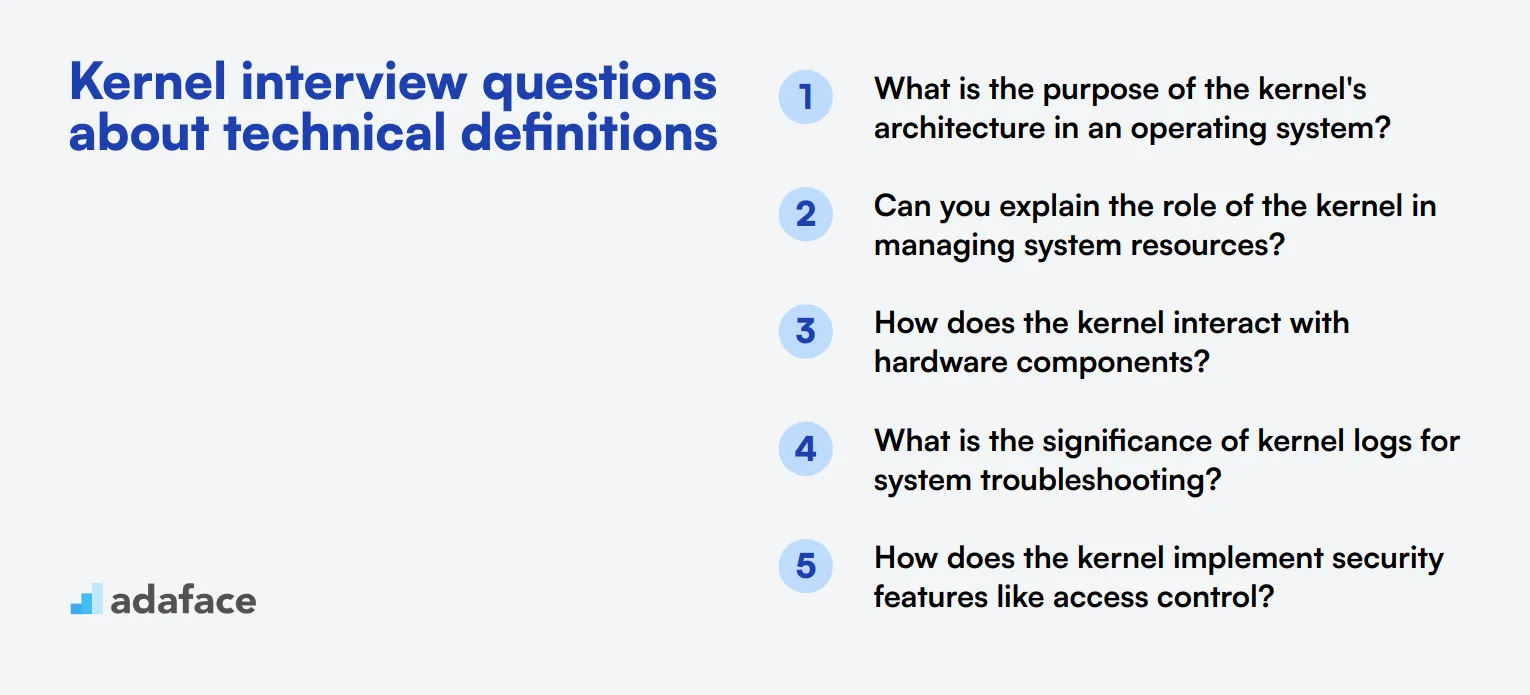
To evaluate candidates' technical knowledge about kernel concepts, use these focused interview questions. They can help you gauge an applicant's understanding of core kernel functionalities and their ability to apply this knowledge effectively in roles like a software engineer.
- What is the purpose of the kernel's architecture in an operating system?
- Can you explain the role of the kernel in managing system resources?
- How does the kernel interact with hardware components?
- What is the significance of kernel logs for system troubleshooting?
- How does the kernel implement security features like access control?
- Can you describe the process of handling a page fault in the kernel?
- What are the advantages of using kernel-based virtual machines?
- How does the kernel support device hotplugging?
- What methods does the kernel use to handle multiple input/output requests?
- Can you explain the difference between cooperative and preemptive multitasking in the kernel?
10 Kernel interview questions about processes and tasks
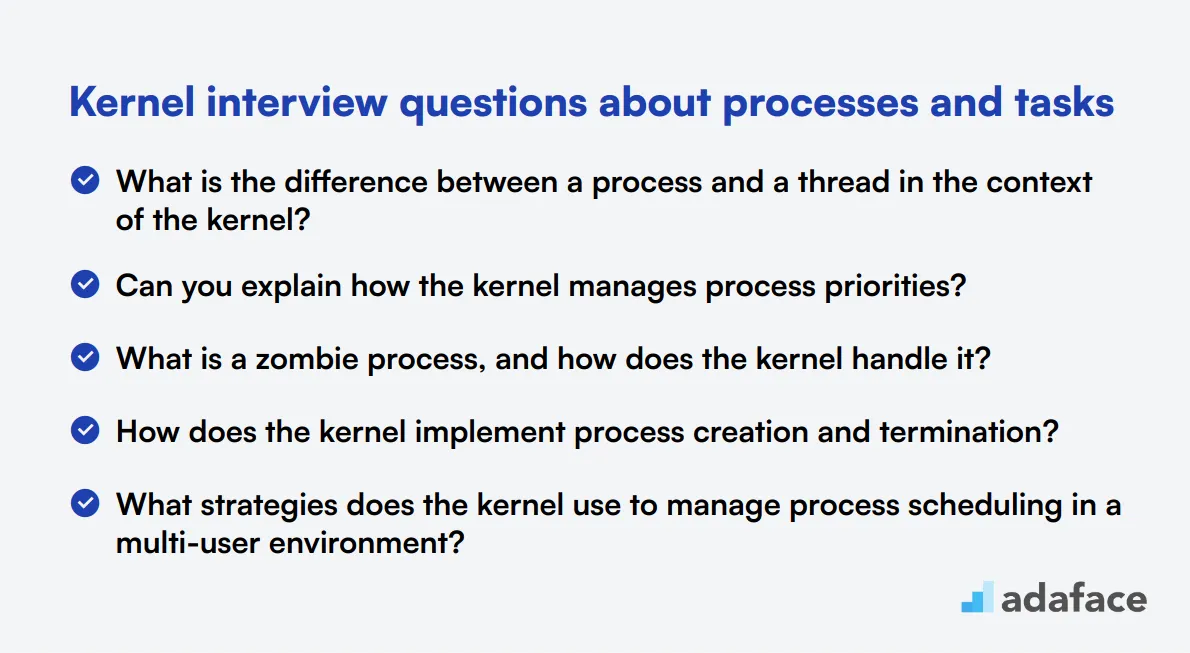
To assess whether candidates possess a solid understanding of process management within kernel operations, ask them some of these targeted questions. These inquiries can be particularly helpful during interviews for roles like software engineer or systems engineer.
- What is the difference between a process and a thread in the context of the kernel?
- Can you explain how the kernel manages process priorities?
- What is a zombie process, and how does the kernel handle it?
- How does the kernel implement process creation and termination?
- What strategies does the kernel use to manage process scheduling in a multi-user environment?
- Can you describe how the kernel implements process isolation?
- What is the role of the `init` process in the Linux kernel?
- How does the kernel implement process communication mechanisms like pipes and message queues?
- Can you explain the concept of a fork bomb and how the kernel can mitigate its effects?
- What is the significance of the process control block (PCB) in the kernel?
Which Kernel skills should you evaluate during the interview phase?
It's impossible to capture the full breadth of a candidate's skills and potential in a single interview. However, for Kernel-related roles, there are key skills that are essential to evaluate to ensure you are bringing in the right talent.
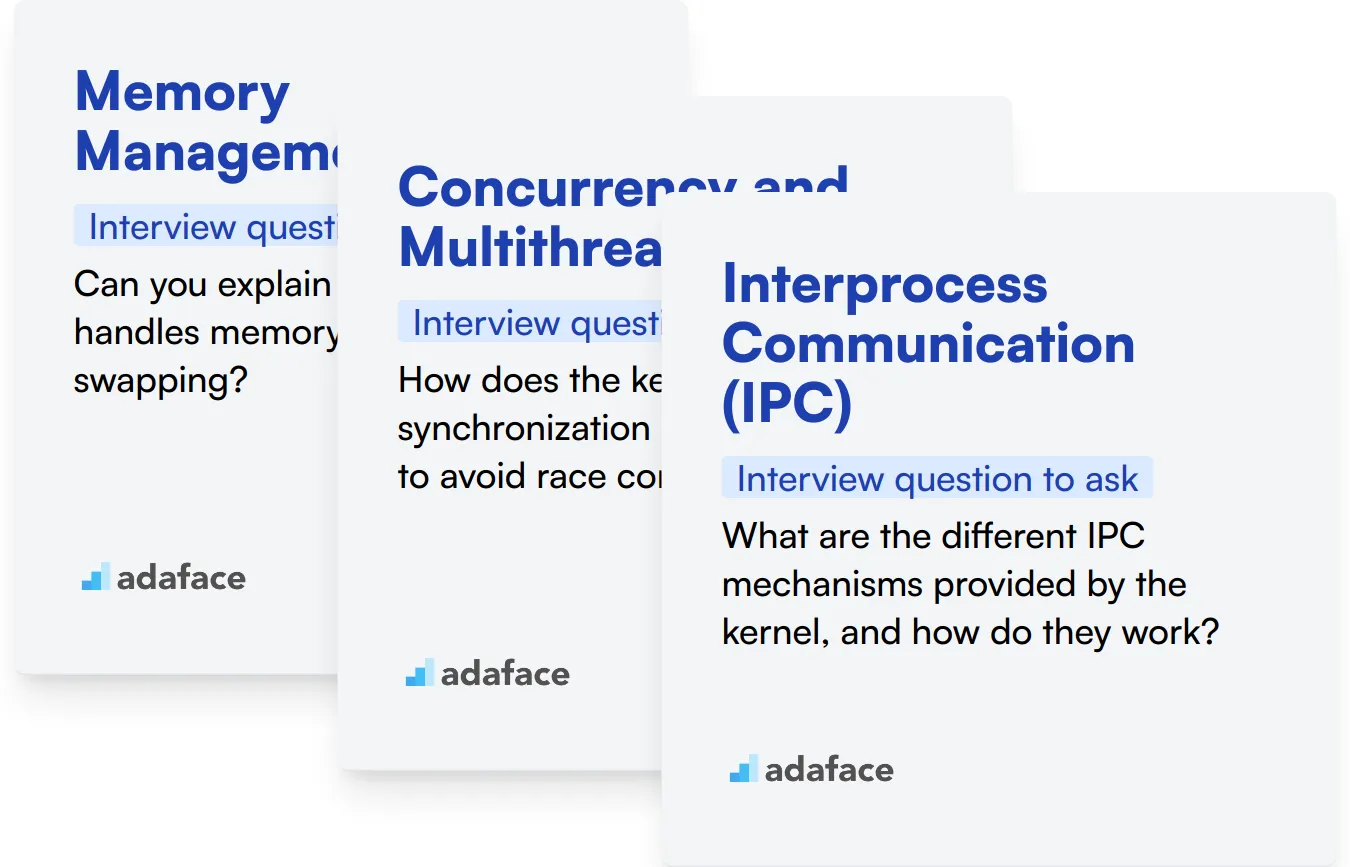
Memory Management
Memory management is a critical aspect of the kernel, as it handles the allocation and deallocation of memory to various processes. Efficient memory management ensures system stability and optimal performance.
To assess this skill, you can use memory management assessment tests that present relevant multiple-choice questions (MCQs). These tests can help filter candidates with the requisite understanding.
During the interview, you can ask targeted questions to judge the candidate's knowledge in memory management.
Can you explain how the kernel handles memory paging and swapping?
Look for answers that explain the concepts of paging, how the kernel swaps pages in and out of the physical memory, and how it manages page faults.
Concurrency and Multithreading
Concurrency and multithreading are essential in kernel development for efficiently managing multiple processes. A deep understanding of these concepts is fundamental for creating a responsive and high-performing system.
To evaluate this skill, consider using concurrency and multithreading assessment tests that include relevant MCQs. These tests will help identify candidates who are familiar with handling concurrent processes in a kernel environment.
You can also ask specific interview questions to gauge the candidate's proficiency in concurrency and multithreading.
How does the kernel ensure synchronization between threads to avoid race conditions?
The candidate should discuss techniques such as mutexes, semaphores, and other synchronization mechanisms used by the kernel to handle race conditions.
Interprocess Communication (IPC)
Interprocess Communication (IPC) mechanisms are vital for kernel operations, allowing processes to communicate and synchronize their actions. Effective IPC ensures efficient and secure data exchanges within an operating system.
You can use IPC assessment tests with relevant MCQs to filter candidates who have a strong grasp of IPC mechanisms and their implementation in the kernel.
Asking targeted questions during the interview can further help assess a candidate's understanding of IPC.
What are the different IPC mechanisms provided by the kernel, and how do they work?
Expect detailed descriptions of various IPC mechanisms like message queues, shared memory, and signals, including their use cases and advantages.
Effective Strategies for Utilizing Kernel Interview Questions
Before you start applying the insights from this post, here are some practical tips to make the most of your Kernel interview questions.
1. Implement Skills Tests Prior to the Interview Stage
Integrating skill tests before the interview can significantly streamline the hiring process by ensuring only qualified candidates reach the interview stage. This method saves time and resources while enhancing the quality of your candidate pool.
For roles that require understanding of Linux environments, consider using tests like the Linux Online Test or the Linux Bash Test to assess essential technical skills before proceeding to interviews.
Utilizing these tests allows you to gauge practical skills effectively and ensures that the candidates you interview have the requisite technical expertise, thereby making the interview process more focused and productive.
2. Curate Your Interview Questions Thoughtfully
Given the limited time in interviews, selecting the right questions is key to evaluating candidates effectively. Focus on questions that assess critical aspects or subskills relevant to the role.
Explore other kernel-related and technical skills interview questions that align with the role's requirements. For instance, questions on Linux DevOps or Linux Administration could complement your Kernel interview questions.
This approach ensures a holistic assessment of the candidate’s capabilities and their fit for the role.
3. Always Ask Follow-Up Questions
Relying solely on the initial set of interview questions might not provide deep insights into a candidate’s expertise. Follow-up questions are necessary to probe deeper into their responses and verify the authenticity of their knowledge.
For example, if a candidate describes their experience with Kernel memory management, you could follow up with, 'Can you elaborate on a specific scenario where you optimized memory usage?' This helps assess their practical knowledge and problem-solving approach.
Leverage Kernel Interview Questions and Skill Tests for Effective Hiring
When aiming to hire professionals proficient in Kernel, it's critical to verify their skills accurately. The best method to achieve this is through specialized skill tests. Consider utilizing Adaface's Linux Online Test to effectively screen candidates before the interview process.
By implementing these tests, you can efficiently shortlist the top candidates, saving time and resources in the recruitment process. For further steps in the hiring cycle, encourage applicants to sign up via Adaface Sign-Up Page or explore detailed offerings on our Online Assessment Platform.
Linux Online Test
Download Kernel interview questions template in multiple formats
Kernel Interview Questions FAQs
Focus on technical skills, problem-solving abilities, understanding of processes and tasks, and knowledge of technical definitions.
Use a mix of basic, intermediate, and advanced questions tailored to the candidate's experience level.
Different levels help to evaluate the depth of knowledge and experience, ensuring the candidate is suitable for the role.
Kernel-specific questions are best suited for technical roles. However, understanding the basics can be useful for related managerial positions.
Junior roles should focus on fundamental concepts and problem-solving, while senior roles should include more advanced and scenario-based questions.

40 min skill tests.
No trick questions.
Accurate shortlisting.
We make it easy for you to find the best candidates in your pipeline with a 40 min skills test.
Try for freeRelated posts
Free resources




